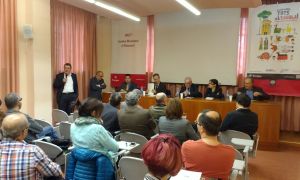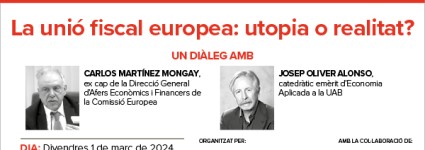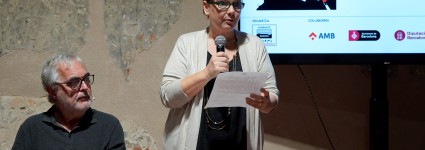The speakers of the colloquium "The mobility of young people of VET: an opportunity of access to work, a factor of improvement of competitiveness" demand that regional governments help vocational training centers to coordinate the mobility of students. They also ask that the schools accompany the students in their transfer.
Doing an Erasmus is common among college students. The European Higher Education Area allows schools to speak with a common language based on training credits, and homologate what has been learned by students abroad. The universities also have the necessary staff to manage the stays. Vocational training centers, however, do not enjoy these conditions. There is, therefore, a gap between the mobility of university students and that of young people in VET. The colloquiums "The mobility of young people of vocational training: an opportunity to access work, a factor of improving competitiveness" have been discussed, organized by the Fundació Catalunya Europa (FCE).
The conference is part of a research program on mobility in the field of vocational training funded by the European Commission. As part of it, the FCE has launched an observatory on its blog, European Agenda. The colloquiums have been held at the headquarters of the Chamber of Commerce of Girona, this morning; and yesterday at the Palau Macaya, of the Obra Social La Caixa, in Barcelona. Both organizations have helped the celebration of the event, which has the support of the European Commission. In the case of Barcelona, ??the conference has counted with the participation of Hble. Meritxell Ruiz, Minister of Education of the Generalitat. Ruiz has called for the involvement "of European institutions to facilitate the mobility of students and teachers of VET", and has advanced that the Department will work more intensely in its promotion.
In Girona, Domènec Espadalé, president of the Chamber of Commerce of the province, and Josep Polanco, director of the territorial services of Teaching of the Generalitat, have welcomed. Polanco explained that currently there are "14 mobility projects in the province of Girona" in operation, and that the Department's intention is to "grow up to 17". Espadalé, for its part, has called for more intensive participation of companies in training programs.
In both expert places of the FCE and the invited organizations have participated in the colloquiums. Ernest Maragall, vice president of the Foundation and member of the The Greens / ALE group in the European Parliament, has described a starting point where "mobility in vocational training still has a timid role", when compared to university exchanges. A fifth part of the students of higher education participate, at some point of their training, in an Erasmus stage.
Meanwhile, VET students face more difficulties than those of university students. Language learning is often a major challenge for the first group. But also the fact that people who have to take a stay are usually "young people who leave for the first time for a long period of time," said Christiane Demontès, president of the Foundation of the European Regions for Research, Education and the formation. It is necessary that the teaching centers and the administrations accompany, therefore, "the students and the families" throughout the process, in order to facilitate the integration in the place of destination. Regions, on the other hand, should also help schools manage exchanges. Unlike the university students, these do not have the administrative capacity of the universities, larger and more endowed with human resources.
It should be added that each country regulates VET in a different way, a feature that complicates the homologation of the contents learned abroad, or the establishment of mobility agreements. As Demontès explains, "in some regions young people have a business contract, but in others they have a practical stay". The curricular organization may also vary. How to manage mobility in these circumstances? Uwe Peleikis, deputy director of the School of Commerce 1 of Stuttgart, has advanced some strategies: "We are carrying out a pilot project, which combines theoretical training in Catalonia with practical teaching in Germany". The key is to take advantage of the strengths of each system: while the German dual model allows intensive learning in the workplace; Spanish "is stronger, at the theoretical level". "The exchange of knowledge among those responsible for VET can help to know the operation of the FP of other countries," adds this expert.
Catalonia, for its part, has launched promising initiatives in recent years. The mobility support program of the Teaching Department provides advice to training centers that want to make an international stay, said Estanislau Vidal-Folch, general deputy director of Programs, Training and Innovation of the Department of Education. And, to facilitate the learning of foreign languages, "the Department is introducing the learning of languages ??like English" in the curriculum, beyond "specific subjects". Vidal-Folch also pointed out that the Erasmus letter of higher education speeds up the procedures for establishing stays in 120 [Catalan] VET centers, in the case of higher grades. The intention is to expand it to 25 more, he said. Vidal-Folch has recognized, however, that the amount of mobility scholarships for students of higher grades is still limited. The reason? These cycles have to compete for the same Erasmus funding as the university programs.
The participation of companies, in any case, is fundamental. Bárbara Arimont, head of human resources at Nestlé, explained that her company started a work mobility program in 2013 that allows 10,000 young people to make European stays at different company branches. And, although the Dual FP students who participate -350- represent a minority, the results are promising: Arimont has cited the case of five students from Girona who attended a stay in Germany. Of these, two are still in the country. And, in general, the stay has served to increase their skills as professionals.
There is, therefore, much to be done to ensure that one day vocational students can make international stays as easily as the university students. But, as Maragall has pointed out, "whoever takes advantage of the opportunities that are opened now will obtain benefits". The European Union is increasingly aware of the problem, to the point that it is discussed in the European Parliament - the MEP of the Greens has submitted to the EU legislature a report that points to the shortcomings of Vocational Training, with regard to mobility. And there is a "coalition of actors", including companies, administrations, educational centers, interested in making mobility in vocational training a reality. What will be the keys of the future? Francesc Colomé, Xavier Farriols and Josep Francí, experts from the FCE and authors of the study "Mobility of young people to vocational training", advanced some keys. Among them, have "intermediate structures" such as regions, which facilitate the management of mobility by educational centers; lengthen the stays, which are now usually two months, or improve their financing.












